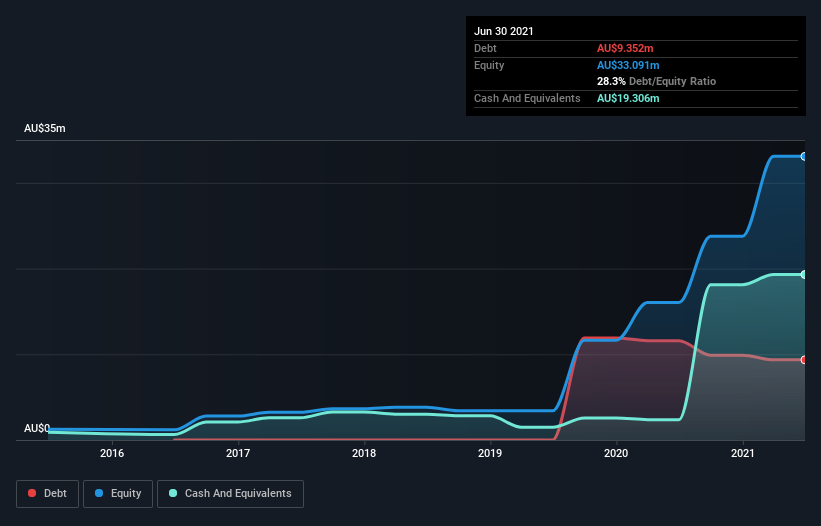Market Herald (ASX:TMH) Seems To Use Debt Quite Sensibly

Warren Buffett famously said, 'Volatility is far from synonymous with risk.' It's only natural to consider a company's balance sheet when you examine how risky it is, since debt is often involved when a business collapses. As with many other companies The Market Herald Limited (ASX:TMH) makes use of debt. But the more important question is: how much risk is that debt creating?
When Is Debt Dangerous?
Debt and other liabilities become risky for a business when it cannot easily fulfill those obligations, either with free cash flow or by raising capital at an attractive price. Part and parcel of capitalism is the process of 'creative destruction' where failed businesses are mercilessly liquidated by their bankers. However, a more frequent (but still costly) occurrence is where a company must issue shares at bargain-basement prices, permanently diluting shareholders, just to shore up its balance sheet. Having said that, the most common situation is where a company manages its debt reasonably well - and to its own advantage. The first step when considering a company's debt levels is to consider its cash and debt together.
See our latest analysis for Market Herald
How Much Debt Does Market Herald Carry?
As you can see below, Market Herald had AU$9.35m of debt at June 2021, down from AU$11.6m a year prior. However, it does have AU$19.3m in cash offsetting this, leading to net cash of AU$9.95m.

How Healthy Is Market Herald's Balance Sheet?
The latest balance sheet data shows that Market Herald had liabilities of AU$10.9m due within a year, and liabilities of AU$13.8m falling due after that. Offsetting this, it had AU$19.3m in cash and AU$2.93m in receivables that were due within 12 months. So it has liabilities totalling AU$2.47m more than its cash and near-term receivables, combined.
This state of affairs indicates that Market Herald's balance sheet looks quite solid, as its total liabilities are just about equal to its liquid assets. So it's very unlikely that the AU$149.6m company is short on cash, but still worth keeping an eye on the balance sheet. While it does have liabilities worth noting, Market Herald also has more cash than debt, so we're pretty confident it can manage its debt safely.
Although Market Herald made a loss at the EBIT level, last year, it was also good to see that it generated AU$6.4m in EBIT over the last twelve months. The balance sheet is clearly the area to focus on when you are analysing debt. But you can't view debt in total isolation; since Market Herald will need earnings to service that debt. So if you're keen to discover more about its earnings, it might be worth checking out this graph of its long term earnings trend.
Finally, a company can only pay off debt with cold hard cash, not accounting profits. Market Herald may have net cash on the balance sheet, but it is still interesting to look at how well the business converts its earnings before interest and tax (EBIT) to free cash flow, because that will influence both its need for, and its capacity to manage debt. In the last year, Market Herald's free cash flow amounted to 50% of its EBIT, less than we'd expect. That's not great, when it comes to paying down debt.
Summing up
We could understand if investors are concerned about Market Herald's liabilities, but we can be reassured by the fact it has has net cash of AU$9.95m. So we don't have any problem with Market Herald's use of debt. There's no doubt that we learn most about debt from the balance sheet. However, not all investment risk resides within the balance sheet - far from it. For example Market Herald has 2 warning signs (and 1 which makes us a bit uncomfortable) we think you should know about.
Of course, if you're the type of investor who prefers buying stocks without the burden of debt, then don't hesitate to discover our exclusive list of net cash growth stocks, today.
If you’re looking to trade Market Herald, open an account with the lowest-cost* platform trusted by professionals, Interactive Brokers. Their clients from over 200 countries and territories trade stocks, options, futures, forex, bonds and funds worldwide from a single integrated account. Promoted
New: Manage All Your Stock Portfolios in One Place
We've created the ultimate portfolio companion for stock investors, and it's free.
• Connect an unlimited number of Portfolios and see your total in one currency
• Be alerted to new Warning Signs or Risks via email or mobile
• Track the Fair Value of your stocks
This article by Simply Wall St is general in nature. We provide commentary based on historical data and analyst forecasts only using an unbiased methodology and our articles are not intended to be financial advice. It does not constitute a recommendation to buy or sell any stock, and does not take account of your objectives, or your financial situation. We aim to bring you long-term focused analysis driven by fundamental data. Note that our analysis may not factor in the latest price-sensitive company announcements or qualitative material. Simply Wall St has no position in any stocks mentioned.
*Interactive Brokers Rated Lowest Cost Broker by StockBrokers.com Annual Online Review 2020
Have feedback on this article? Concerned about the content? Get in touch with us directly. Alternatively, email editorial-team (at) simplywallst.com.
About ASX:GUM
Gumtree Australia Markets
Operates a digital business news and investor relations platform in Australia and internationally.
Slight and slightly overvalued.
Similar Companies
Market Insights
Community Narratives



